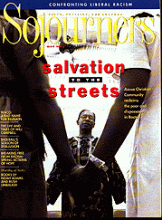TORONTO -- For many indigenous people and others, last fall's national referendum on the renewal of the Canadian Constitution was a significant first because of the deal's commitment to native self-government. But despite its touted potential to bring historic gains for aboriginal people, the Charlottetown Accord was sacked -- and conspicuous on the no side were the very people it was intended to have helped: Native people voted nearly 70 percent against the reform proposal.
The previous round of constitutional dealing three years ago, which resulted in an accord known as Meech Lake, had contained little acknowledgment of aboriginal nations. It was effectively blocked by a Cree member of the Manitoba legislature, Elijah Harper, who was pictured in the nation's media holding the feather of an eagle. Within weeks of this 1990 defeat, Canada was rocked by a violent and explosive confrontation in the heart of the two societies that were at the center of this fall's constitutional conflict: the Mohawk Indians of Oka defending their territory in the largely French province of Quebec.
Harper's eagle feather, and the AK-47s of the Mohawk warriors, served to raise the public profile of aboriginal peoples and their concerns as no amount of lobbying and conferences ever could. When last year's round of efforts to renew the constitution began, the leaders of the four largest native groups in the country were invited to the table. However, not until well into the discussion would the premier of Quebec return to the talks, insisting that the negotiations held nothing new for his province. Instead, a vision of Quebec separating from Canada was circulating again, with a renewed energy.
Read the Full Article

